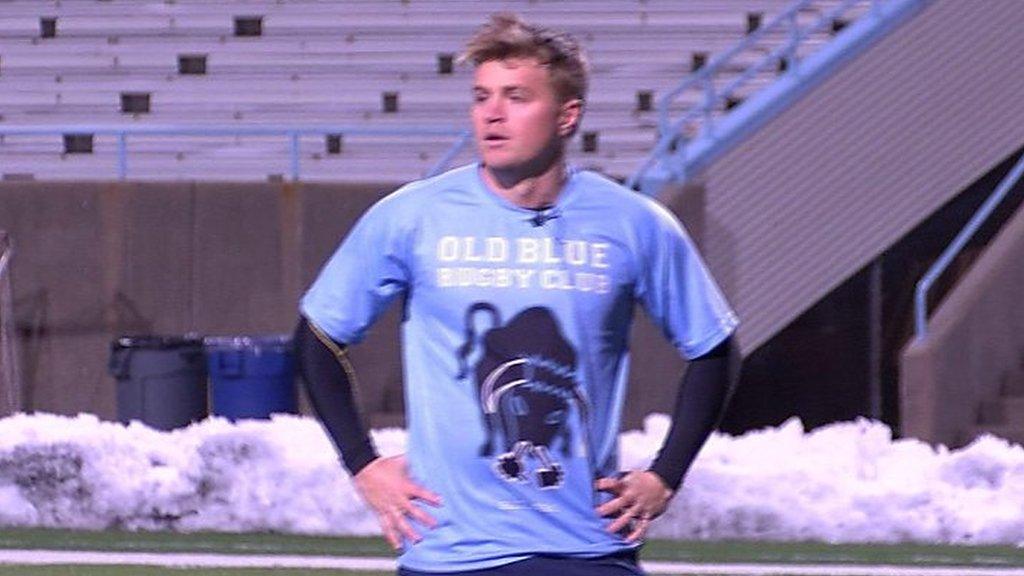Jamie Murphy: The Welsh-born Bridgend centre who plays rugby for Germany
- Published
- comments
Welshman helping Germany's World Cup bid
It seemed an unfamiliar setting for a rugby team - a serene and silent street with half timbered, Dutch barn roofs. An incongruous flurry of red fleeces were making their way to the local supermarket.
Leading the pack? A boy from Bridgend with a German grandmother and an Irish surname, Jamie Murphy.
This is Muhlheim am Main, a small town of just 26,000 people that hosts the German rugby team when they play their home matches in the city Offenbach. This particular street boasted just one small pub - a confined space where football scarves adorned the walls and live commentary echoed off the walls.
On a Friday evening before the German team took on Belgium in the Rugby Europe Championship, it was the only place to meet.
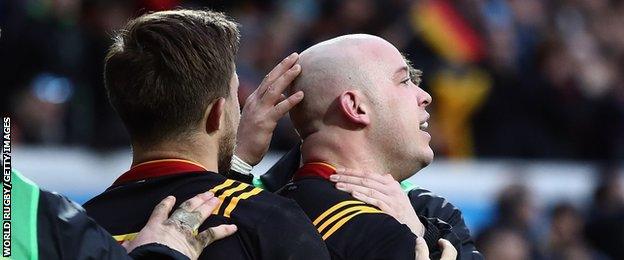
Jamie Murphy scored a try in Germany's win over Belgium
"I don't think many people take much notice of us here to be honest - you can see it's all about football," Murphy said.
Murphy, who was born in Wales and plays centre for Bridgend, admits it was the round ball that first made him aware of his German sporting heritage.
"When I was a kid I always envisioned myself playing for the German football team, because they were much more successful than the Welsh team," he told BBC Wales Sport.
His grandmother, born in Berlin in 1942, met a British solder in the 1960s and raised her family in Bridgend. Murphy, who has also played international rugby league for Wales as well as a club career with both the Scorpions and Crusaders, first joined the German set-up in 2015.
"It's surreal to be playing over here. I think it's safe to say I'm the first Bridgend-born player to be representing the country but I'm very proud to do so," the 27-year-old added.
"The travelling isn't always easy. It took me 22 hours to get back from Georgia; I had a delayed flight, a cancelled flight and then a cancelled train. But it's worth it."
The road to Japan
What perhaps makes it worthwhile are the 4,126 fans who turned up to watch the match against Belgium on Saturday.
Is it a reflection of the sport's infancy when winning a line-out is celebrated in a similar way to scoring a try? When there's little frustration vented at handling errors or knock-ons? This certainly wasn't Welsh rugby, but it did unearth some of the game's true values.
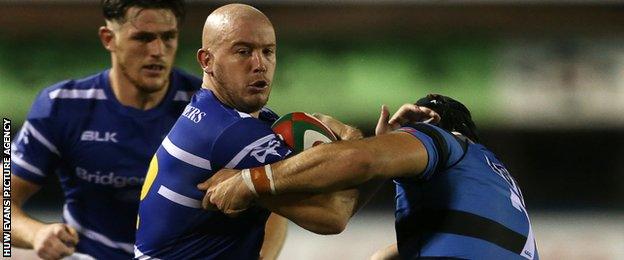
Bridgend's Jamie Murphy, who made his Germany debut against Romania, has also played for Ospreys
The partisan crowd were clearly inspired by a defining victory against 16th seeds Romania a few weeks previously.
If that victory served as an indication of things to come, Saturday's 34-29 victory over a Belgium team full of potential confirmed that a top-three finish is a realistic prospect for this German team. With Georgia likely to top the table, a second-place spot would guarantee World Cup qualification, while third would see them enter the repechage play-off system.
"The interest in German rugby has grown in a matter of three weeks," said Murphy. "We've already won two home games and it's great to see so many children here watch us win games. We can play Spain next week with some real aspirations and targets to finish as high as possible."
Financial boost
The streets outside the Sparda Bank Hessen football stadium were littered with young boys and girls taking part in 'Get into rugby workshops' - a key part of the Wild Rugby Academy set up in 2007 to boost participation at a junior level.
Dr Hans Peter Wild, the marketing executive behind drinks company Capri Sun, backed the initiative and is now similarly bankrolling the high-performance end of the sport. He has already invested £3m on new training pitches and is also funding a £12m training centre.
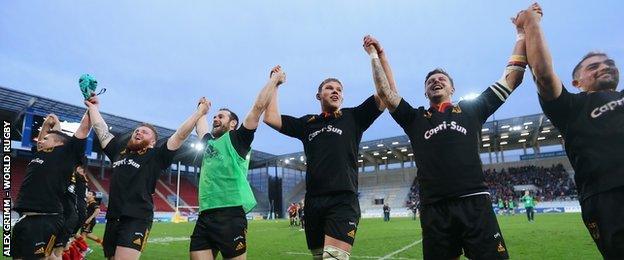
Germany have beaten Romania and Belgium but lost to Georgia in the 2017 Rugby Europe Championship
South African head coach Kobus Potgieter admits they have a lot to be thankful for.
"I've been here for nine or 10 years now and it's recently I've noticed the amount of clubs are increasing, the amount of players are increasing. There are more games on TV and we now play in soccer stadiums which was never possible before," Potgieter said.
For now, both players and coaches have one clear aim: the Rugby World Cup in Tokyo 2019. But Potgieter admits that with Georgia having won the past six championships, there needs to be a strategic plan to grow the global game.
"There have to be more games against top-tier nations. We need to broaden the ability to play against top team opponents during the season - it would really help us to develop our game," Potgieter added.
Wales v Germany at the Brewery Field? Watch this space.
- Published8 March 2017

- Published8 March 2017
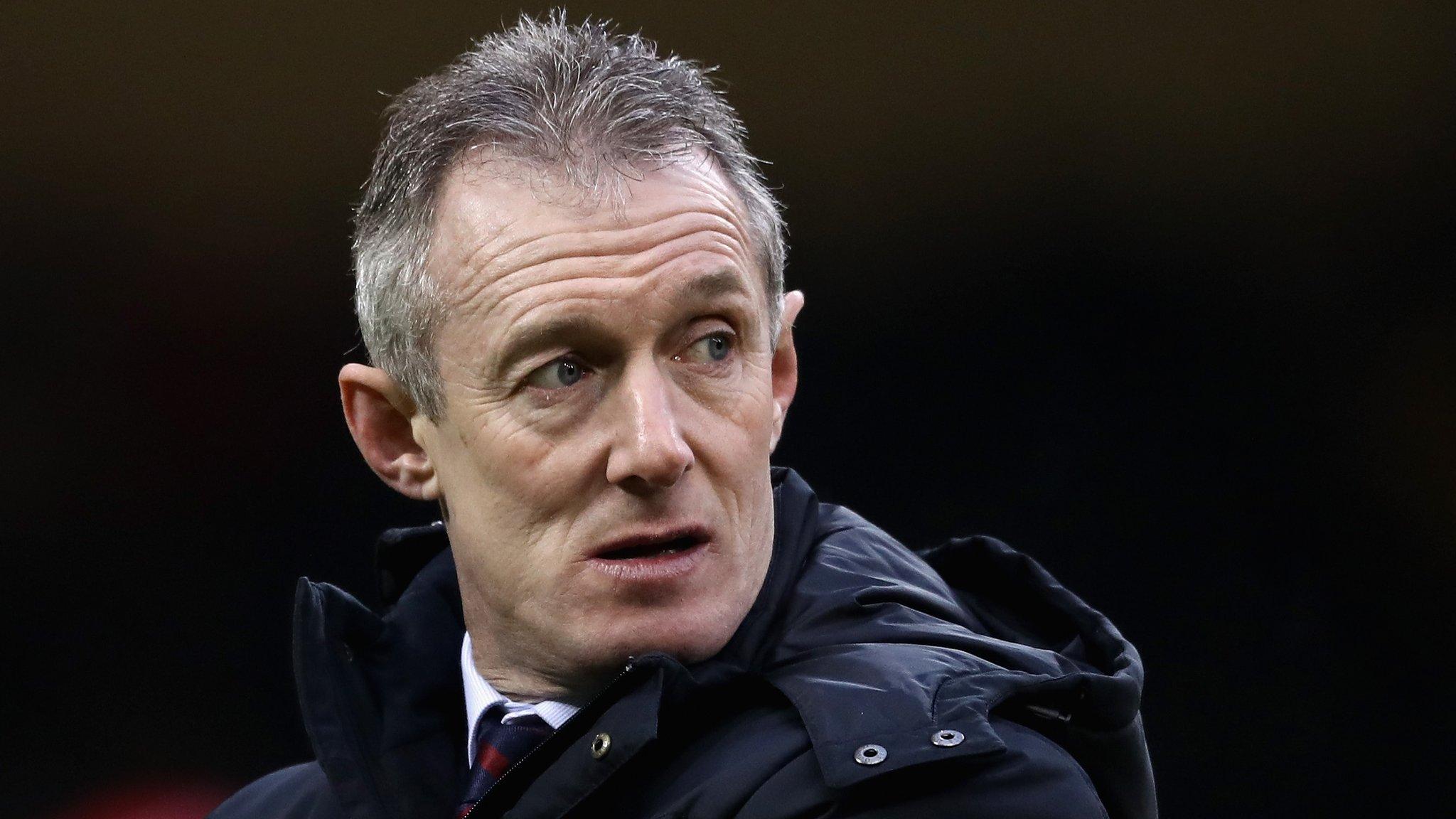
- Published19 February 2017
